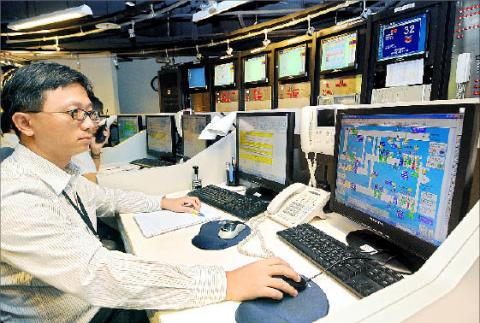Taipei 101 became the tallest building in the world to receive Leadership in Energy and Environmental Design (LEED) Platinum Certification yesterday at an award ceremony in the building’s lobby.
In cooperation with SL+A International, EcoTech International and Siemens Limited Taiwan, staff at Taipei 101 worked for more than 20 months to implement changes that would allow the building to meet the increasingly stringent certification standards.
Developed by the US Green Building Council, LEED is the most widely used green building rating system in the world. Taipei 101 achieved the platinum level certification in the Existing Buildings: Operations and Maintenance category.

Photo: Fang Pin-chao, Taipei Times
With a total floor space of 357,721m2, 90 tenants and a day-time population of more than 10,000 people, the project posed a number of challenges to implement, not to mention the NT$60 million (US$2.08 million) price-tag.
However, it was well worth it, Taipei 101 officials said.
“We started improving energy efficiency in 2007 and in the three years to 2010, we have already made that money back. From now on, we expect to save NT$36 million or US$1.2 million each year on energy costs, compared to 2007 levels” said Cathy Yang (楊文琪), vice president of the tower division of Taipei 101.
As for the wider impact of the project, green building experts said the assumption was that only newly constructed buildings could meet LEED standards, but Taipei 101’s certification could be the “lighthouse” project leading the way for other existing buildings to follow suit.
“When a world celebrity building like [Taipei] 101 achieves the highest level of certification, you know that every tall building on the planet as well as every little building on the planet is going to be looking somehow to emulate the achievement,” Rob Watson, chairman, CEO and chief scientist of EcoTech International and the “father of the LEED” certification, said yesterday.
Mark MacCracken, chairman of the US Green Building Council, said the achievement by Taipei 101 at the platinum level has taken away the excuses from other buildings around the world for not being able to do so.
“[People would say] ‘oh, we can’t do that. We’re too tall, we’re too this, we have too many tenants,’ this sort of thing — that discussion is now off the table because of this building and I think that that’s the biggest statement this building has made for the industry,” MacCracken said.

Taiwan Semiconductor Manufacturing Co (TSMC, 台積電) yesterday said that its investment plan in Arizona is going according to schedule, following a local media report claiming that the company is planning to break ground on its third wafer fab in the US in June. In a statement, TSMC said it does not comment on market speculation, but that its investments in Arizona are proceeding well. TSMC is investing more than US$65 billion in Arizona to build three advanced wafer fabs. The first one has started production using the 4-nanometer (nm) process, while the second one would start mass production using the

When an apartment comes up for rent in Germany’s big cities, hundreds of prospective tenants often queue down the street to view it, but the acute shortage of affordable housing is getting scant attention ahead of today’s snap general election. “Housing is one of the main problems for people, but nobody talks about it, nobody takes it seriously,” said Andreas Ibel, president of Build Europe, an association representing housing developers. Migration and the sluggish economy top the list of voters’ concerns, but analysts say housing policy fails to break through as returns on investment take time to register, making the

‘SILVER LINING’: Although the news caused TSMC to fall on the local market, an analyst said that as tariffs are not set to go into effect until April, there is still time for negotiations US President Donald Trump on Tuesday said that he would likely impose tariffs on semiconductor, automobile and pharmaceutical imports of about 25 percent, with an announcement coming as soon as April 2 in a move that would represent a dramatic widening of the US leader’s trade war. “I probably will tell you that on April 2, but it’ll be in the neighborhood of 25 percent,” Trump told reporters at his Mar-a-Lago club when asked about his plan for auto tariffs. Asked about similar levies on pharmaceutical drugs and semiconductors, the president said that “it’ll be 25 percent and higher, and it’ll

CHIP BOOM: Revenue for the semiconductor industry is set to reach US$1 trillion by 2032, opening up opportunities for the chip pacakging and testing company, it said ASE Technology Holding Co (日月光投控), the world’s largest provider of outsourced semiconductor assembly and test (OSAT) services, yesterday launched a new advanced manufacturing facility in Penang, Malaysia, aiming to meet growing demand for emerging technologies such as generative artificial intelligence (AI) applications. The US$300 million facility is a critical step in expanding ASE’s global footprint, offering an alternative for customers from the US, Europe, Japan, South Korea and China to assemble and test chips outside of Taiwan amid efforts to diversify supply chains. The plant, the company’s fifth in Malaysia, is part of a strategic expansion plan that would more than triple